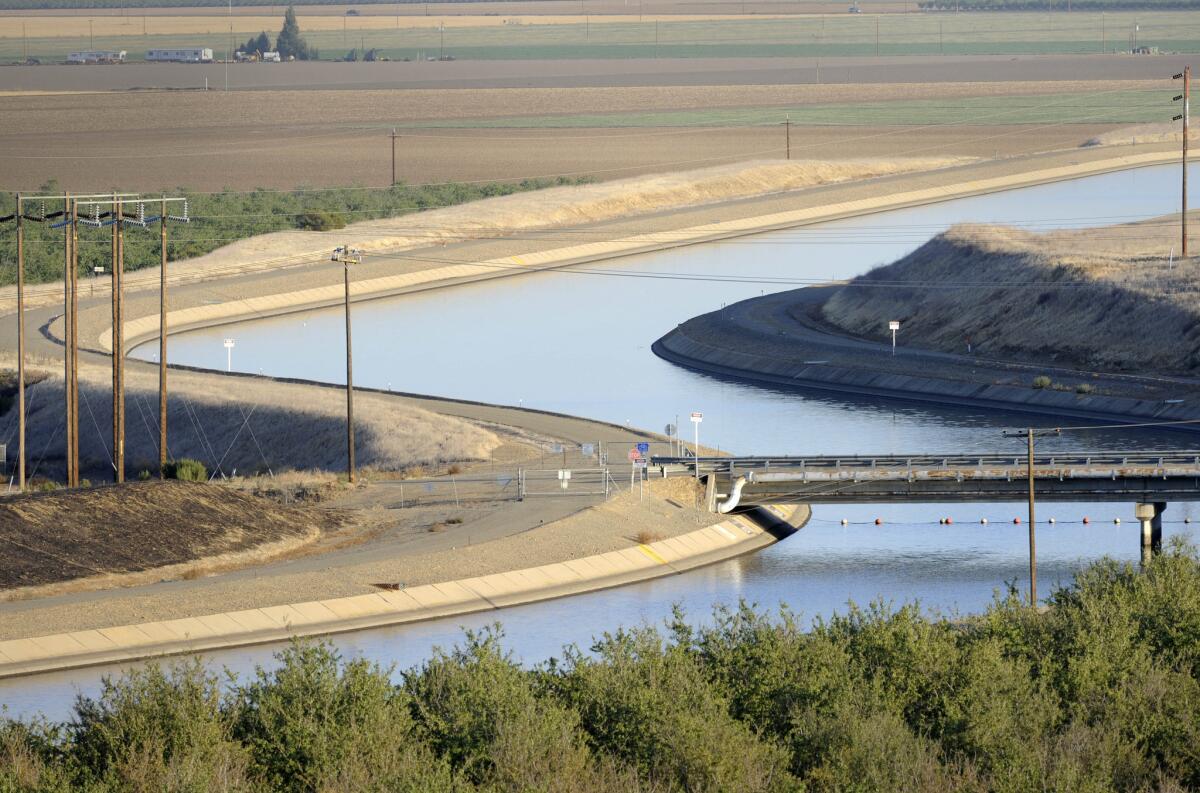Bond jitters spread after Westlands Water District investigation

Westlands Water District canals in California’s Central Valley, photographed in 2009.
- Share via
Jitters over a federal investigation of Westlands Water District bled over into the proposed delta tunnel project Thursday as a bond rating agency placed a negative watch on a $29.8-million bond helping to fund the controversial water diversion plan.
Fitch Ratings took that cautious step back because Westlands is the sole guarantor of a 2013 bond issued by the San Luis & Delta-Mendota Water Authority, which operates significant portions of the federal water project in the western San Joaquin Valley.
Westlands is one of 29 members of that authority, which controls more than 3 million acre-feet of water in the western San Joaquin Valley and in San Benito and Santa Clara counties.
“They were issued with 100% Westlands backing,” Fitch analyst Teri Wenck said of the water authority bonds. The rating firm has made clear that any change in the financial evaluation of Westlands would affect the rating of bonds issued by the water authority, she added.
The move comes a day after Westlands reached a $125,000 settlement with the Securities and Exchange Commission over accounting procedures that the SEC said exaggerated the district’s ability to cover its annual debt payments. The district altered its revenue ledgers to meet a threshold for a high bond rating so it would not have to raise rates for some of the wealthiest growers in the state, regulators said.
Westland’s general manager, Thomas W. Birmingham, joked during a 2010 board meeting that the adjustments amounted to “a little Enron accounting,” a reference to the massive fraud that caused the 2001 collapse of that Houston energy and commodities company, according to the SEC.
The penalty was the largest to be levied by the SEC against a municipal bond agency. Birmingham was assessed a separate $50,000 civil penalty, and the district’s former treasurer, L. David Ciapponi, received a $20,000 fine.
But it may cost Westlands much more. Fitch’s negative watch extends to six other Westland bonds amounting to $193.6 million, plus the $29.8-million bond for the tunnel project.
If Fitch takes further action to downgrade the bonds’ underlying AA ratings, it could affect the district’s cost of borrowing as well as the market for the bonds.
The authority and its members have been fighting delta water restrictions aimed at protecting the state’s fisheries, and have pushed for diversion tunnels that would shunt Sacramento River water around the ecologically fragile estuary system.
Critics of the tunnel project don’t believe that growers will be able to shoulder the cost, an argument they say has been bolstered by Westland’s questionable accounting practices.
Westland spokesman Johnny Amaral said the district would have no public comment until it consulted with its bond advisor. An officials for the water authority did not return calls for comment Thursday. On Wednesday, a district statement said the accounting procedures at issue were approved by an independent auditor.
“Westlands, Birmingham and Ciapponi determined that entering into the settlement to fully resolve the matter was in the district’s best interest,” the statement said.
At issue was a “debt service coverage ratio,” a measure of the district’s ability to collect enough revenue to meet or exceed its annual debt obligations. Because of the district’s “extraordinary accounting procedures,” that figure was 10 times higher than it would have been using conventional accounting procedures, the SEC said.
That calculation obscured expenses incurred because of water cutbacks prompted by the state’s drought and allowed the district to avoid raising rates for its clients, which include some of the biggest agricultural companies in the state, according to regulators. Westland received only 10% of its contracted allotment from the Central Valley Project in 2009, and 45% in 2010.
A public agency governed by landowners within its borders, Westlands had operating revenue of more than $120 million in 2014. It contracts with the U.S. Bureau of Reclamation for taxpayer-subsidized irrigation supplies, which it sells to growers.
geoffrey.mohan@latimes.com
More to Read
Inside the business of entertainment
The Wide Shot brings you news, analysis and insights on everything from streaming wars to production — and what it all means for the future.
You may occasionally receive promotional content from the Los Angeles Times.











